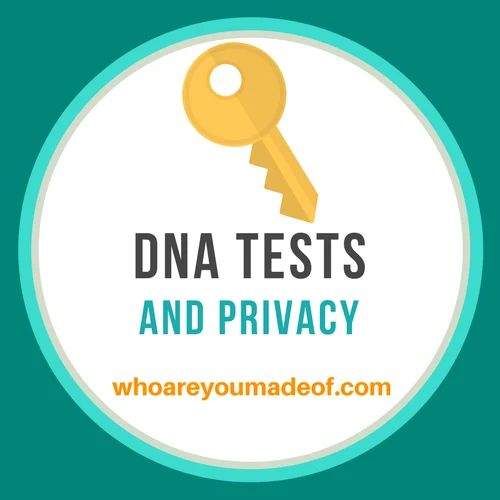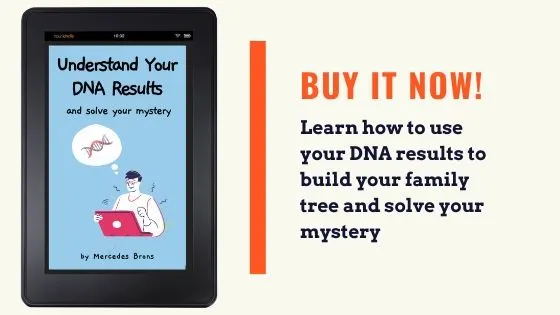If you have been thinking about doing a DNA test, like the one offered by Ancestry DNA or 23 and Me, for example, you might be worried about the safety of your DNA. There are many issues to consider when it comes to DNA and privacy, and I am going to do my best to address as many concerns related to DNA tests and privacy in this post.
Some of the topics covered in this article include:
- Security of DNA data - are you paranoid to worry?
- Governmental access to DNA test results
- Possible ways that DNA information could be misused
- Discussion on weighing the risks and benefits of DNA testing
Are we paranoid if we worry about the safety of our DNA results, or are we delusional to think that our DNA is secure? These questions are being asked and debated more frequently as the popularity of DNA testing grows.

How secure are your DNA results?
There are a lot of articles on website articles out there with "click bait" titles - basically, they are just trying to get you to click on them. To do this, they have to come up with a worst-case scenario in order to get your attention. Some articles, especially the ones that tend to go viral, actually contain misinformation (read: FAKE NEWS). Before you get worried about the security of your genetic information, try to find statistics and research that supports either perspective in the debate.
In reality, our data is very secure. All of the major testing companies understand that privacy and security is extremely important to their customers, and if we suddenly started to hear scary stories of DNA information being hacked and used in terrible ways, well, it would be bad business. We would all go to our accounts, and delete our kits. Their databases would shrink, and we would tell all of our friends to stay away from genetic testing. The companies would eventually go out of business!
So trust me, they want to keep our data safe. But don't just take my word for it:
- Ancestry DNA has published a page on their website addressing privacy concerns. They specifically state that we retain ownership of our DNA, and explain that they never share information with employers or insurers without asking for consent first. They have also never sold our genetic information to third-party marketers, insurers, or employers and require law enforcement to go through a legal process (read more in the section about government below).
- 23 and Me, on their privacy page, describes how they keep your identifying information and your genetic information separate, making it even very unlikely that a security breach could result in matching DNA information to account holders.
- On the Family Tree DNA page about their Sample Access and Transfer Policy, they reiterate the company's policy about how they believe that customers own their DNA. You could theoretically delete your DNA results and request your original sample be returned to you - for a $50 processing fee, of course. That's what I call ownership!
Is it easy for the government to get access to DNA information?
In 2016, 23 and Me published an article addressing this specific issue. At the time the article was published, they had over 1.2 million customers and said that in the past 10 years, had only received five requests from law enforcement to access a customer's information. They were able to fight this access and were successful - no customer data was shared with law enforcement. One interesting item that 23 and Me wrote in this article: They don't believe that the genetic information stored by the company would be useful, for example, for comparison in the CODIS database since the types of DNA tests used to obtain each result is very different.
- Check out the 23 and Me transparency report here
Ancestry has a page on their website specifically for law enforcement officials. They are very clear about the exact procedure that law enforcement needs to go through in order to obtain a user's genetic information, which would include a "valid search warrant from a government agency with proper jurisdiction". They also say that they will, under most circumstances, notify a user that their information has been requested unless "legally restricted from doing so".
Note: It's important to note that the information that Ancestry stores about us includes our family tree and family records, financial and account information, as well as genetic information. Ancestry has only received one request for genetic material for a customer, and has never received a National Security Request for information.
- You can see the Ancestry DNA transparency report here
One interesting aspect of law enforcement attempting to obtain genetic information from users of these big companies? When you receive a DNA kit in the mail, how does the company know for sure that you were the one who spit in the tube? These companies have no way to know 100% for sure (and therefore, neither does law enforcement!) that the genetic information contained in your account actually belongs to do.
As a final comment, based on the numbers released by the companies, there is a 0.000001% chance that law enforcement requests the DNA data of any particular user - and the probability is even less than that for those of us who try to "keep our noses clean", as the expression goes. Basically, of all of the reasons to be worried about the way my genetic information might be used against me, this is the one that worries me the least.
What about health insurance and pre-existing conditions?
There was a law passed in 2008 (called GINA) that prohibits health insurers and employers from making decisions about hiring and coverage based on genetic information. One thing that is important to know about this law is that it was passed before genetic testing was as popular as it is now: Ancestry DNA didn't even exist, for example. Now that millions upon millions of people have tested, we probably need more comprehensive legislation that takes this into account.
From a logistical perspective, I can't easily imagine a scenario where a company would know that I've taken a test like this, have the ability to access my results, and be able to analyze them in a meaningful way. Understanding how genes interact with each other to predispose us to disease is a very new science, and even if our results tell us that we are possibly at risk for something, it still remains an educated guess.
With all this said, we do need to keep a close eye on our state and national lawmakers. Why? In early 2017, there was a bill sponsored by some Republican house members that would have exempted employers using corporate "wellness" programs from the GINA law, and theoretically could have allowed companies to compel, or at least strongly encourage, employees to share their genetic testing results with the company. Fortunately, it got stuck in the house and didn't pass, probably because of a lot of negative press - so let's pay attention and make sure laws like that don't get anywhere in Congress.
Can genetic information be used against you?
This is where we wade into the murky waters of conspiracy theories and science fiction. Is it theoretically possible for our genetic material to planted at the scene of a crime? I suppose, but that is kind of far-fetched. You could also get my DNA from my coffee cup at Starbucks in the morning - just pick it up out of the trash after I walk out. Can I be cloned? Not yet, but I'm sure someone is working on it - since I am so amazing 😉
One thing that we should understand is that while we do have a unique genetic makeup, identical DNA to ours is already out there, contained within the genomes of our family members. Even if you don't do a DNA test yourself, the DNA of your parents contains all of your genes, and the DNA of your children contains most of it.
Our energy is probably better sepnt making sure that companies understand and protect our concerns, and encouraging our legislators to protect the privacy of our DNA through codified laws.
What to do? Weighing the pros and cons of DNA testing
It wouldn't be fair to write an article like this without mentioning some of the wonderful things that happen as a result of so many people participating in the genetic DNA tests:
- People who are adopted or who have an unknown biological parent are reunited with their families every day
- You can learn about your family's rich history, through your ethnicity estimate. A great way to settle decade-long family arguments, or solve mysteries
- Genealogy is a very exciting and satisfying hobby, and many people use their DNA results to learn more about their family tree and break through brick walls
- You can meet "new" family members, like I have. My life is so much fuller now; I've been able to connect with 1st and 2nd cousins who are descended from my immigrant ancestors, and even found cousins living in Europe who I now can go visit
Only you can decide if the very minor risk of genetic testing is worth it to you. There are plenty of benefits, as I mention above, but it still remains a personal decision.
Conclusion
The decision about whether or not to do a genetic DNA test is a profoundly individual one. There is so much to be gained by accessing the information that is contained within our genome, and this needs to be weighed against the small possibility that your data could be used in a way that is detrimental to your interests.
Obviously, from my personal perspective, I believe that I have more to gain than to lose by testing my DNA and sharing it with various other websites that can analyze my results. This is a deeply personal decision, and of course, you should be respected no matter what you decide.
If you have been thinking about the security of your DNA information, what are the main concerns that you have? I tried to address as many concerns about DNA tests and privacy in this article, but there are many ways to view a topic, and I am interested in hearing from you. Maybe there is something that I have not thought of yet.
Thank you for stopping by!

